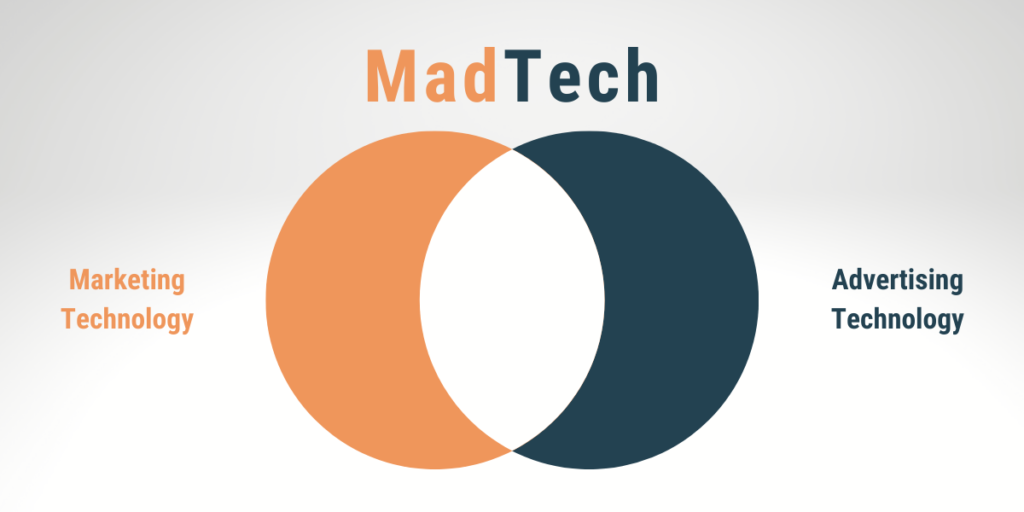How and why the MadTech world could be your next job opportunity?
Few years ago, marketing and advertising used to live separately. Marketing, advertising and technology job opportunities seemed not to be connected at all and professionals needed to have very distinct skills, appropriate to each job role. But with time, the line between the marketing and advertising processes started to blur, and the job market followed the trend.
This article will through these major topics:
What is MadTech?
The convergence between advertising and marketing happened after the ever-increasing reliance on data and the interconnectedness brought by technology. The evolution of marketing and its connection with advertising resulted in the birth of a new term embedding the 3 words: marketing, advertising and technology.
MadTech was first coined by the marketer consultant David M. Raab in 2015 as a consequence of marketing and advertising technology intertwining themselves and bonding because of data. The difference between the two was not as clear anymore. As Raab states:
Even a fully integrated MarTech stack can’t deliver a wholly consistent customer experience. Advertising still plays a major role in a customer’s brand experience. Moreover, advertising itself is becoming increasingly personalized and interactive. Consumers don’t make a distinction between marketing and advertising interactions. And to meet their expectations, neither can marketers.
Finally, “MadTech” is the union between MarTech (Marketing Technology) and AdTech (Advertising Technology).
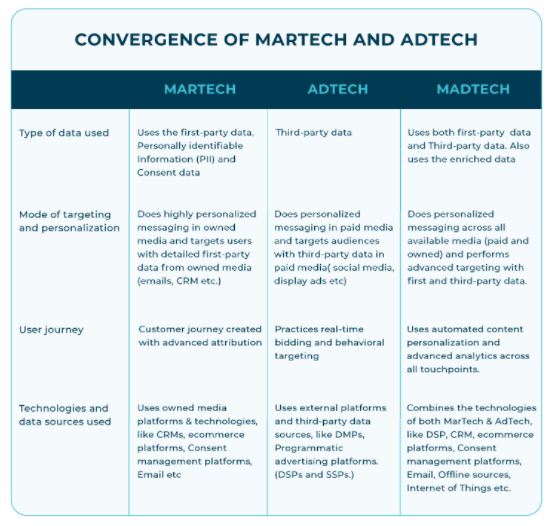
AdTech vs MarTech
AdTech is the set of practises for conveying a message to a target audience. To do this, professionals use cloud platforms to create, run, measure, and manage online advertising campaigns across many websites or/and apps.
Advertising often involves reaching out to a broader audience, including people who are not aware of a company’s products and their benefits. Advertising content to a non-specific audience leaves little room for personalization and effectiveness. So, today, companies use advertising to target those users who actively seek information or look for interaction with the brand. Details and data collected through the interaction with the customer allow a more targeted advertising.
Platforms for AdTech:
-
An ad server is a web-based technology platform responsible for storing ads, making delivery decisions about which ads to show on a website, serving them, collecting and reporting the data (such as impressions, clicks, etc.).
-
Demand-side platforms (DSPs) allow companies to run advertising campaigns and buy mobile, search, and video ads from a marketplace on which publishers list advertising inventory. These platforms allow for the management of advertising across many real-time bidding networks.
-
Supply-side platforms (SSPs) help publishers sell their adv spaces in an automated and efficient way to make revenue. The technology of SSPs is able to create the ad exchanges, the virtual place in which ads are traded.
-
An ad network is a commercial entity that takes a publisher’s unsold adv space, packages it up, and offers it to advertisers on a cost per mille (CPM) basis.
-
SEA (search engine advertising) consists in pay-per-click campaigns to buy keywords on the search engines. While many might call it SEM (search engine marketing), SEM is actually the conjunction between activities made to encourage organic results (SEO) and, indeed, the paid advertising (SEA). The most popular platform is Google Ads, which allows advertisers to bid on CPC on keywords and also bid on inventory of its AdSense ad network.
- Social paid media tools, such as Facebook Ads, Linkedin ads, Tik Tok ads and Twitter ads are all walled gardens in which advertisers can perform advertising campaigns (mainly or only) on that specific social media platform. Usually brands can deeply target people based on interests, intent and match with demographic information.
MarTech is about nurturing and informing known customers. It allows marketers to create, run, manage and gather insights from online marketing campaigns and run “onsite marketing” such as email marketing, A/B testing, personalization, user-feedback surveys.
Online marketing platforms are able to store detailed information on interactions with users which enables marketers to segment the audience in categories and personalize the communication.
Platforms for MarTech:
-
Web-analytics tools analyse data collected by a website or mobile app and are usually used to improve the user experience of a website and discover how users interact with a website.
-
A customer relationship management (CRM) platform stores and manages a company’s interactions with current and potential customers. Often, a CRM will include data from various other MarTech tools, such as web analytics.
-
A customer-data platform (CDP) orchestrates the interaction with first-party data and third-party data, triggering actions mainly based on marketing purposes. With the use of a CDP, marketers can manage all their data in one place, create audiences from it, and utilize it in their marketing activities, building, among the other features, audience look-a-like segments to activate in advertising activity.
-
Social-media-management platforms for content management allow marketers to create, schedule, and measure their social media posts and activities. Influencer marketing tools, paid social media and biddable media, fall into AdTech.
-
SEO and content-optimization tools enable marketers to improve their ranking position on search engines like Google and Bing.
- Personalization tools tailor the messages of a website, email, SMS to match information, needs and interests of individual users based on information stored about them.
Why is MadTech relevant?
MadTech is relevant today as technology is quickly advancing, and significant innovations in online marketing and advertising have followed. Thanks to technology, big brands have a huge amount of stored data allowing them to form a much richer picture of the audiences to target – what offers would be most relevant, when customers are most likely to buy, and the optimal combination of marketing tactics required for success.
MadTech marketers are already building systems to offer a unique and hyper-personalized experience at the right time and in the right context, for every customer. Even newer technologies such as machine learning and artificial intelligence are helping to step further and predict what customers might want to buy before they even have decided to do so.
- 35% of firms today have acted on converging MarTech/ AdTech.
- The majority of firms today are in the planning stage for the MadTech revolution.
- While only 7% didn’t plan for MadTech yet.
With the rise of investments in technology and automation, companies will need to shift from a traditional approach to a more digital-oriented one where MadTech will be the new rule and not the exception. According to Gartner’s 2021 CMO Spend Survey, technology is a priority for 26% of marketing managers interviewed as it represents “a path to proximity and customer recovery”. Companies will therefore invest more and more in training on the platforms and tools that bring together marketing, advertising and technology.
Education is what separates you from your goals, it’s what’s between you and who you want to become.
Start your MadTech career today!
Skills required in MadTech
It’s still about the people. For all businesses, understanding people remains the strategic cornerstone. Since the advent of human-centric marketing, listening to your customers and their needs has become the most important skill marketers are required nowadays. Customer behaviour, principles of psychology, empathy, active listening, research methods are some of the required skills and knowledge to understand how people make choices, how they think about brands and how they are influenced.
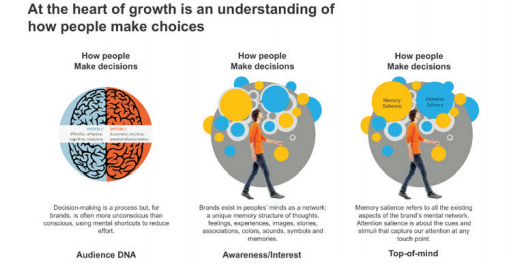
Read and analyse data to make smart decisions. Making sense of MadTech starts with data and insights, and only the first one is readily available today. A big majority of marketers and advertising professionals today reports that finding actionable insights in the data is a pain point. Therefore, tracking and measuring brand effectiveness and advertising effectiveness are now highly required skills to be able to make smart decisions about future marketing actions.
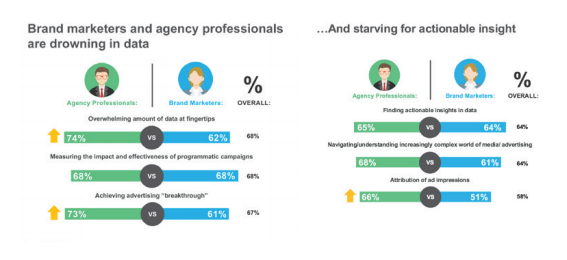
However, according to the IAB Europe Human Capital Digital Environment 2019 research, 75% of recruiters struggle to find candidates with MadTech knowledge or specialization on the market. This represents a market mismatch where, on the one hand, recruiters cannot find the best fitting candidate, and students or professionals, on the other hand, lack crucial skills or knowledge to enter the MadTech professional world.
Why should you learn about MadTech?
The job market demand for technology experts is growing year after year. According to McKinsey &Company, the overall spending on technology could increase by more than 50% between 2015 and 2030. By 2030, they estimate that this trend could create 20 million to 50 million jobs globally. Good news for all the students and candidates passionate about tech and its implementations in each aspect of our lives.
Even agency influencers and marketers are positive about the increasingly influential role of technology in their businesses. In a study conducted in 2016 by Ipsos Connected, 66% of the involved agency professionals and brand marketers said technology made it easier to reach their audience and 55% stated technology is helpful to improve the customer experience.
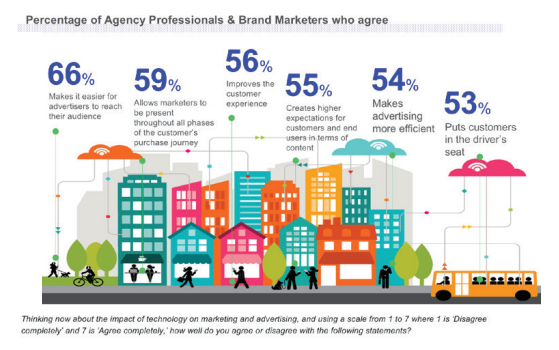
The marketing and advertising world now needs professionals who have a more digital-oriented knowledge and skills. As a result, the fast growth of technology implementation offers more job opportunities day by day, around 7 million only in Europe right now.
And according to Sirking Research the trend is destined to continue in 2021 – 60% of marketing leaders anticipated to increase marketing technology spending in the next 12 months. As remote working is becoming a “normal” part of the current workforce, many marketing teams are relying on technology to collaborate on campaigns and manage work remotely.
To sum up, the job market is now looking for professionals who have a complete set of skills in marketing technology and advertising technology. At GAMS, we believe the best way to acquire such tech skills is by practically using the tools MadTech jobs require.
The video above shows some tools, jobs and potential career paths in MadTech, and explains how GAMS can help students exploring the MadTech world and have the opportunity to use these tools to acquire practical knowledge and experience.

